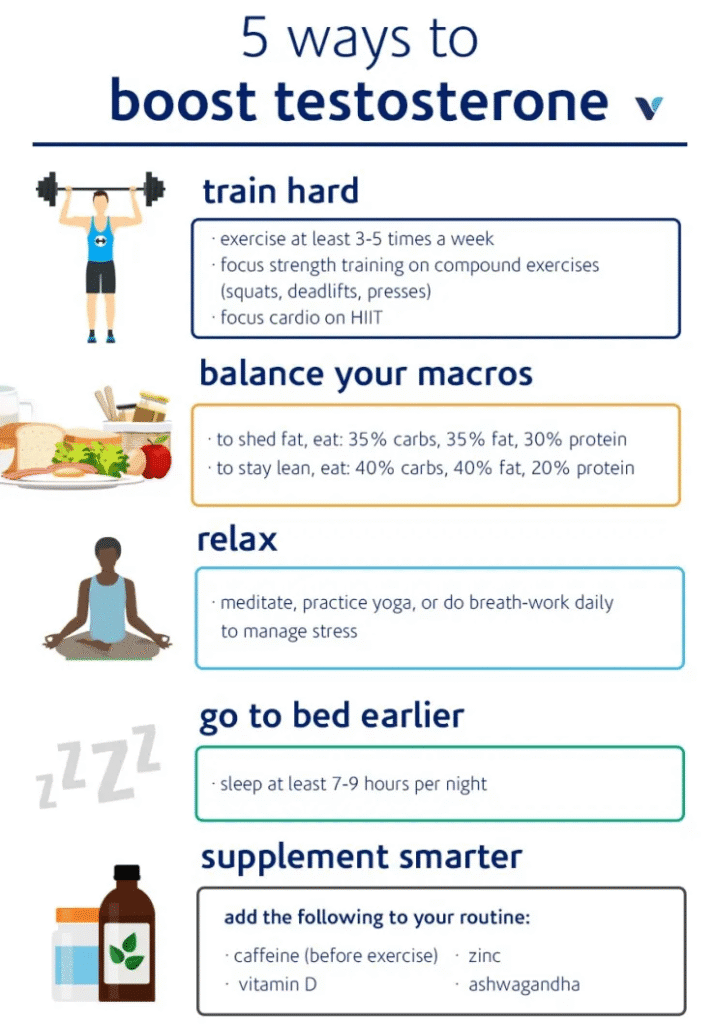Introduction
If you’re like most men, you’ve heard of testosterone, but you were never actually taught what it is, why it matters, or what happens when it starts to drop. Maybe you associate it with gym bros, ageing, or performance enhancement. Maybe you’re curious but feel overwhelmed by the noise online.
Here’s the truth: testosterone affects nearly every aspect of your life, your energy, your focus, your drive, your sleep, your sex life, your mood, your ability to build muscle, and even how you carry yourself. It’s not just a “hormone.” It’s the biological rhythm behind how you feel like a man.
And yet… most of us were never given a manual.
That ends today. This article is the guide I wish I had in my 20s, clear, grounded, and stripped of the fluff. Let’s dive into Testosterone 101 and finally learn what every man deserves to understand about his body, his energy, and his power.
Table of Contents
What is Testosterone?

Testosterone is a steroid hormone produced primarily in the testicles (for men), and in smaller amounts in the ovaries (for women) and adrenal glands. In men, it’s the main driver of:
- Muscle growth
- Facial and body hair
- Voice deepening during puberty
- Libido and sexual function
- Sperm production
- Bone density
- Red blood cell creation
- Mood stability and assertiveness
In short, it’s the hormone that fuels your edge.
Healthy testosterone levels don’t make you aggressive; they help you feel stable, focused, and in command. When testosterone is low, men often feel tired, unmotivated, emotionally flat, and physically sluggish.
Harvard Health – Testosterone in Men
Why Most Men Are Never Taught This (And Why That’s a Problem)
Let’s be honest, when was the last time someone explained your hormones to you in a way that made sense?
In school, we got vague health class lectures. In adulthood, we’re left to Google things when symptoms show up. Meanwhile, cultural narratives swing between “Testosterone is toxic!” and “Boost T instantly with this one weird trick!”
This confusion leaves men disempowered. You can’t optimise what you don’t understand. And when you start to feel off, low energy, less drive, more belly fat, you blame yourself. Or worse, you normalise it.
But low testosterone isn’t a moral failing. It’s a biological signal. And the sooner you understand it, the better you can navigate it.
Signs Your Testosterone Might Be Low

Here’s the tricky part: low testosterone doesn’t always feel dramatic. It creeps in subtly. You might still “function” and go to work, hit the gym, hold conversations, but feel like something’s missing.
Common signs of low testosterone include:
- Decreased libido or morning erections
- Fat gain (especially around the belly)
- Mood swings or emotional flatness
- Low motivation or brain fog
- Decreased muscle mass or strength
- Poor sleep quality
- Increased fatigue despite rest
- Reduced confidence or assertiveness
These signs don’t prove you have low T, but they’re worth noticing. The earlier you act, the better your chances of correcting course naturally.
The Science Behind Testosterone Production

Your body doesn’t just “decide” to make testosterone. It follows a system called the HPG Axis (Hypothalamus–Pituitary–Gonadal Axis):
- The hypothalamus in your brain releases GnRH (gonadotropin-releasing hormone)
- This signals the pituitary gland to release LH (luteinizing hormone)
- LH travels to your testes, telling them to produce testosterone.
This system is sensitive. Stress, poor sleep, excess body fat, endocrine disruptors (like BPA), alcohol, and certain medications can all interfere with it.
Think of testosterone as a team project. Your brain, your sleep, your habits, and your environment all play a role.
7 Lifestyle Habits That Naturally Support Healthy Testosterone

Forget gimmicks. These are the real foundations. I’ve used them. So have thousands of other men. Here’s what works:
Examine.com – Testosterone and Lifestyle Factors
1. Sleep Deep, Not Just Long
You produce most of your daily testosterone during REM sleep. It’s not just about 8 hours, it’s about quality.
Tips:
- No screens 60–90 minutes before bed
- Cool room (65–68°F)
- Blackout curtains
- Magnesium glycinate at night
2. Strength Train (But Don’t Overtrain)
Compound movements (squats, deadlifts, presses) stimulate testosterone. Train 3–4x per week with intensity, but don’t overdo it too much; cardio or chronic exhaustion can backfire.
3. Eat for Hormones
Your hormones are made from fats and micronutrients. Avoid processed foods, seed oils, and sugar bombs. Embrace:
- Pasture-raised eggs
- Oysters (zinc)
- Brazil nuts (selenium)
- Olive oil, avocado, red meat
4. Manage Stress Like a Pro
Cortisol (your stress hormone) suppresses testosterone. Learn to shift out of fight-or-flight mode with:
- Deep breathing (box breath)
- Nature walks
- Meditation
- Time off screens
5. Drop the Plastics
BPA and other endocrine disruptors found in plastic bottles, receipts, canned food linings, and air fresheners can mimic estrogen.
Swap to:
- Glass containers
- Stainless steel bottles
- Natural personal care products
6. Sunlight & Vitamin D
Low vitamin D = low T. Aim for 15–30 minutes of sun per day. If you live in low-light regions, consider supplementing with D3 + K2.
7. Build a Life That Inspires You
This isn’t “woo-woo.” Testosterone increases when you live with purpose. Challenge. Vision. Growth. If you’re stuck in a soul-sucking routine, your biology feels it.
Take inventory. Where are you stagnating? Where can you create, lead, and risk again?
Common Myths (And What’s Actually True)
Myth 1: Testosterone makes you angry or aggressive.
Truth: It actually improves confidence and emotional regulation when balanced.
Myth 2: You can fix low T with one supplement.
Truth: No single pill solves a lifestyle issue.
Myth 3: Low T is inevitable after 30.
Truth: It’s common but not natural. Many men maintain healthy levels through their 40s and 50s with the right habits.
Myth 4: If I still have libido, my testosterone must be fine.
Truth: Libido can be influenced by dopamine, novelty, and more. T levels affect more than just sex drive.
When to Get Tested (And What to Ask For)
If you suspect low T, get tested. But ask for more than just “total testosterone.”
Request these:
- Total testosterone
- Free testosterone
- SHBG (sex hormone binding globulin)
- LH (luteinizing hormone)
- Estradiol
- DHEA-S
- Cortisol (optional)
Morning blood draw (7–10 am) is best. Then, interpret results with a practitioner who understands male hormones, not just “normal ranges.”
LabCorp – Understanding Hormone Blood Tests
FAQ
Q: What’s a healthy testosterone level?
A: Depends on the lab, but many functional doctors consider 600–900 ng/dL total T and 15–25 ng/dL free T ideal for healthy men.
Q: Can I raise my testosterone without medication?
A: Often yes, especially if you catch it early and fix root habits. But medical support (like TRT) may be appropriate in some cases.
Q: How long before I feel better?
A: Most men report improved energy and mood within 3–6 weeks of consistent habit change. Full restoration can take 3–6 months.
Q: Is TRT bad?
A: Not inherently. But it should be a last resort, not a first step. Fix your lifestyle first.
Conclusion & Next Steps
Testosterone isn’t just about sex or muscle. It’s about who you are when you feel alive. Focused. Motivated. Grounded.
You don’t need to chase gimmicks. You need to return to your biological blueprint.
Start simple:
- Fix your sleep
- Move with purpose
- Eat real food
- Cut the toxic inputs.
- Reignite your mission
And above all, don’t wait for a doctor to tell you something’s wrong before you do what’s right.
Suggested Articles
1. The Ultimate Guide to Boosting Testosterone Naturally (No Pills Required)
A complete lifestyle playbook for men who want to take back control of their T-levels without shortcuts.
2. How Masculine Energy Works: And 7 Habits to Strengthen It Daily
Learn the energetic side of testosterone: how presence, direction, and purpose fuel your hormonal engine.
3. The Truth About TRT: When to Consider Testosterone Therapy
An honest look at testosterone replacement therapy, who it’s for, and what you need to know before committing.
4. The Sleep-Testosterone Connection
Why your nighttime routine is just as important as your gym routine when it comes to hormone health.
5. 5 Hidden T-Killers in Your Daily Life (And How to Eliminate Them)
Explore the sneaky habits and products silently wrecking your hormonal health and how to swap them out fast.


